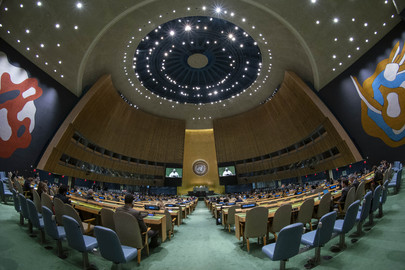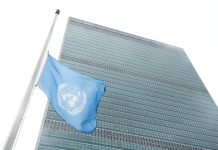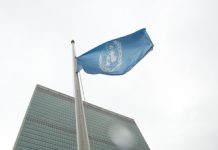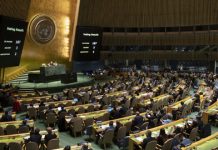‘No end’ expected to floods, storms as world heats up: WMO chief
The world’s water resources face growing pressure from climate change while emergencies such as heavy flooding are increasingly impacting lives and livelihoods, the UN World Meteorological Organization (WMO) said on Thursday.
Data crunched by the UN agency in a new report confirms that waterborne disasters have been happening amid increasingly warm air temperatures, which allow more humidity to be held in the atmosphere leading to heavier rainfall.
Here’s WMO Secretary-General Celeste Saulo:
“Water-related hazards continue to cause major devastation this year; the latest examples are the devastating monsoon flooding in Pakistan, floods in South Sudan and the deadly flash-floods in the Indonesian island of Bali. And unfortunately, we see no end to this trend.”
Ms. Saulo noted that 2024 was the hottest in 175 years since records began, with the annual mean surface temperature reaching 1.55 °C above the pre-industrial baseline from 1850 to 1900.
The WMO report highlights the devastating flash-floods in central and eastern Europe last September which uprooted tens of thousands of people. Similar disasters are likely to happen more often, even though they should – in theory – be extremely rare, it maintained.
Gaza: civilians caught in crossfire amid Israeli clashes with Hamas, warns OCHA
To Gaza City, where UN aid teams have warned that civilians are getting caught up in deadly crossfire as the Israeli military continues its push to drive out Hamas fighters.
The development came as Israel once again ordered hundreds of thousands of Palestinians remaining in the enclave’s largest city to leave within 48 hours.
In an urgent appeal the UN aid coordination office, OCHA, demanded immediate protection for all non-combatants.
Hundreds of thousands of people are believed to remain in Gaza City, although many continue to flee, amid active hostilities.
Syria’s fragile gains threatened by foreign militaries and political exclusion
Syria stands between recovery and relapse, the UN Security Council heard on Thursday.
In a meeting in New York, UN Special Envoy Geir Pedersen told ambassadors that the interim authorities in Damascus have inherited “shattered buildings” and “a hollowed-out economy”.
Mr. Pedersen – who announced he would shortly be stepping down from his post – said that fragile progress had opened new humanitarian and political pathways for the wartorn country, but it was threatened by international exclusion, foreign military intervention and funding shortfalls.
The veteran UN negotiator – who’s been pushing for democratic transition in Syria for years – urged the international community to support Syria and stand “robustly” against foreign intervention”.
He also urged respect for Syria’s sovereignty and territorial integrity amid reported Israeli strikes this month.
Latest UN data indicates that more than 70 per cent of Syrians require some form of aid, nine million are acutely food insecure, seven million remain displaced inside the country and four million are refugees abroad.
Daniel Johnson, UN News
Source of original article: United Nations (news.un.org). Photo credit: UN. The content of this article does not necessarily reflect the views or opinion of Global Diaspora News (www.globaldiasporanews.com).
To submit your press release: (https://www.globaldiasporanews.com/pr).
To advertise on Global Diaspora News: (www.globaldiasporanews.com/ads).
Sign up to Global Diaspora News newsletter (https://www.globaldiasporanews.com/newsletter/) to start receiving updates and opportunities directly in your email inbox for free.





























